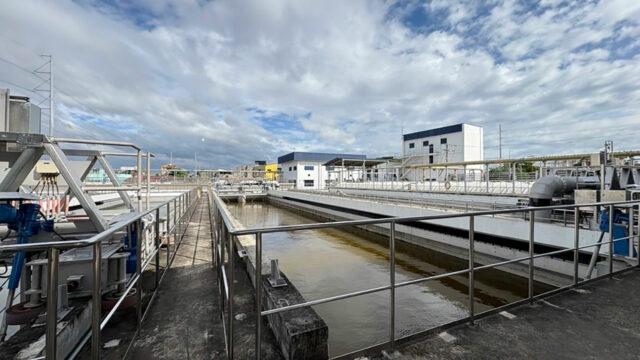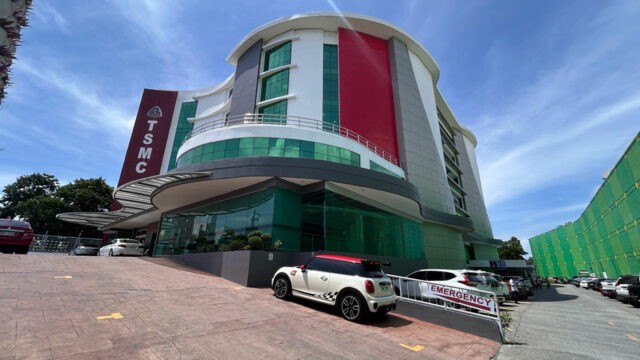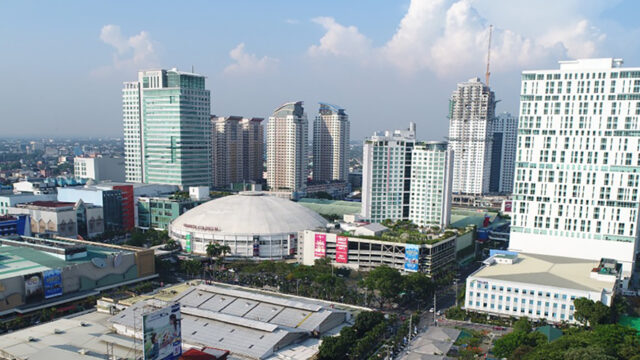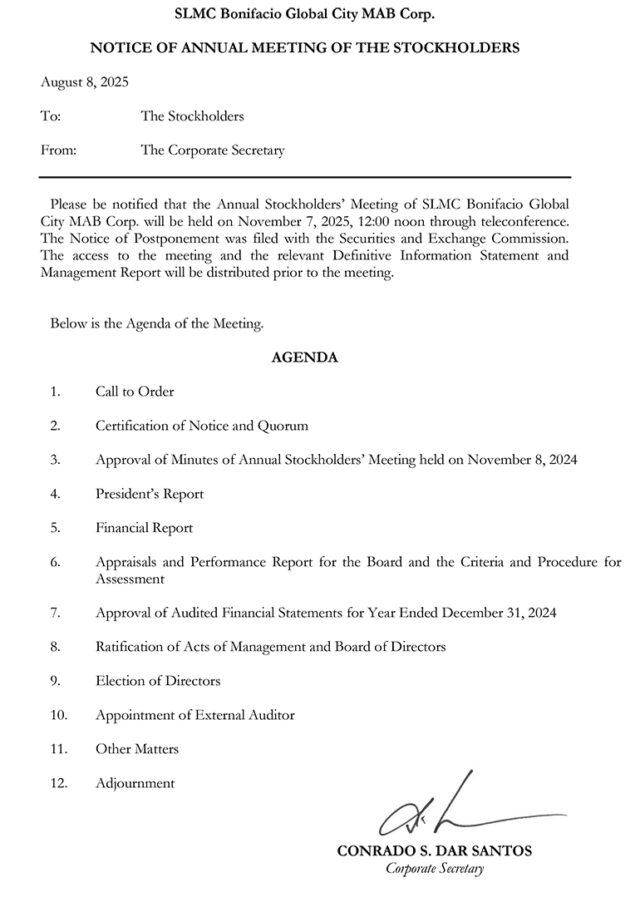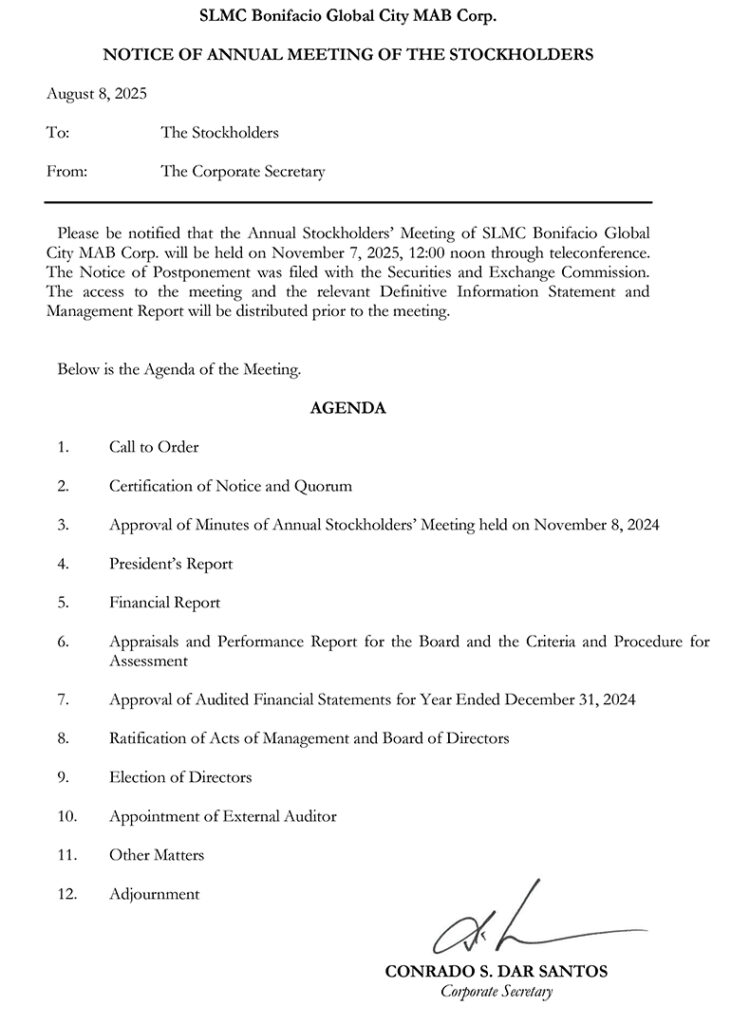Honoring the builders of the nation’s future
Asia CEO Awards 2025 hails the Philippines’ top leaders and organizations
By Bjorn Biel M. Beltran, Special Features and Content Assistant Editor
The Philippines is closing in on upper-middle-income status, a milestone the World Bank expects within the next two years. But challenges remain, significant ones that threaten to disrupt the momentum that the country has been building for more than a decade. Beyond numbers, it is vision — not luck — that determines the nation’s trajectory.
This is why the Asia CEO Awards 2025, themed “Predict the Future by Creating It,” is recognizing the individuals and companies whose leadership, innovation, and resilience are turning these long-held aspirations into tangible progress, seizing opportunities by first opening the doors to it.
The Asia CEO Awards is one of the most prominent events in the Filipino business community, celebrating outstanding individuals and organizations driving economic growth across the country. Held at the Manila Marriott Hotel last Oct. 14, this year’s ceremony recognized achievers whose work continues to elevate the Philippines’ global competitiveness.
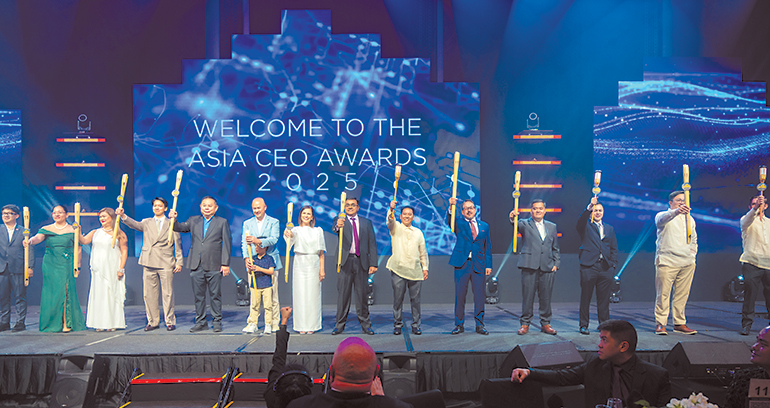
Kicking off the event was Bruce Winton, area general manager for the Philippines at Marriott International, who acknowledged the contributions of the over 600 awards nominees towards creating a brighter future for the country.
“These are turbulent times that we operate and live in, and it behooves us sometimes to stay focused on our true course, rather than be distracted by vents around us,” he said.
“The companies represented here tonight, regardless of your specialty, your service, or your product, have proven that this type of focus not only champions talent, creativity, and the abilities of the Filipino workforce, but it also opens up the future to growth, development, and positive economic contributions.”
Jack Madrid, president and chief executive officer (CEO) of the IT and Business Process Association of the Philippines (IBPAP), emphasized the unique advantage of the country in a world that is flirting with fragmentation, division, and distrust.

“We have people that are known not just for our talent, but for our empathy, our creativity, and our grit. So, while the world debates recession, the Philippines continues to grow. While others retreat from globalization, we continue to build bridges through trade, technology, and talent. And while pessimism seems to dominate the global narrative, our story is one of optimism, renewal, and possibility,” he said.
In her keynote address, Rosemarie P. Rafael, chairperson and president of Airspeed, said, “Tonight, as we celebrate leadership, excellence, and innovation, I want to congratulate all those who are the Circle of Excellence awardees and the grand winners. You are proof that even at times like this, Filipino leaders and companies can rise, can innovate, and can persevere.”
Paving the way forward
 Starting off the awards proper, Engr. Mark Kennedy Bantugon, CEO and president of Pili AdheSeal Inc., received the Young Leader of the Year award for his remarkable accomplishments in advancing the nation’s economy and international standing through pioneering innovations in sustainable materials.
Starting off the awards proper, Engr. Mark Kennedy Bantugon, CEO and president of Pili AdheSeal Inc., received the Young Leader of the Year award for his remarkable accomplishments in advancing the nation’s economy and international standing through pioneering innovations in sustainable materials.
The IBPAP IT-BPM Techblazer of the Year was awarded to Sanjiv Gupta, president and country head of IBM Solutions Delivery, Inc., for his contributions to strengthening the Philippines’ IT-BPM industry and its human capital base.
Innodata Knowledge Services, Inc. received the PSG Global Solutions Diversity Company of the Year award for championing inclusivity and fostering a workplace culture that embraces and respects human differences.
PSG Global Solutions, Inc. itself was named mWell Technology Company of the Year for its success in leveraging technology and innovation to create impactful solutions in information and communications technology, biotechnology, and engineering.
Agridom was recognized as the Airspeed SME Company of the Year, honoring its service excellence and commitment to raising operational standards among Philippine small and medium enterprises.
TP in the Philippines earned the Service Excellence Company of the Year award for demonstrating exceptional quality and customer satisfaction across its business operations.
 CEO Rahul Jolly said that the recognition is a celebration of their over 60,000 Filipino workforce, professionals whose empathy, agility, and skill continue to shape the future of customer experience.
CEO Rahul Jolly said that the recognition is a celebration of their over 60,000 Filipino workforce, professionals whose empathy, agility, and skill continue to shape the future of customer experience.
“In an industry as competitive and fast-evolving as ours, this recognition reinforces TP’s position as a trusted transformation partner and a global benchmark for service excellence,” he said.
 “At TP in the Philippines, we firmly believe that technology amplifies human potential — it never replaces it. Our approach has always been tech-empowered human excellence. Equally important, we nurture a culture of continuous learning and inclusion, ensuring our people evolve with technology, not behind it. Empowering our people to harness innovation with confidence is how we keep them, and our organization, future-ready.”
“At TP in the Philippines, we firmly believe that technology amplifies human potential — it never replaces it. Our approach has always been tech-empowered human excellence. Equally important, we nurture a culture of continuous learning and inclusion, ensuring our people evolve with technology, not behind it. Empowering our people to harness innovation with confidence is how we keep them, and our organization, future-ready.”
The Microsourcing Apex Company of the Year was awarded to Maya, cited for its significant role in advancing the country’s digital economy and showcasing strong leadership that maximized stakeholder value.
Ruth Yu-Owen, president and CEO of Upgrade Energy Philippines, was named Figari Entrepreneur of the Year for successfully building a pioneering renewable energy enterprise that provides employment opportunities and contributes to sustainable development.
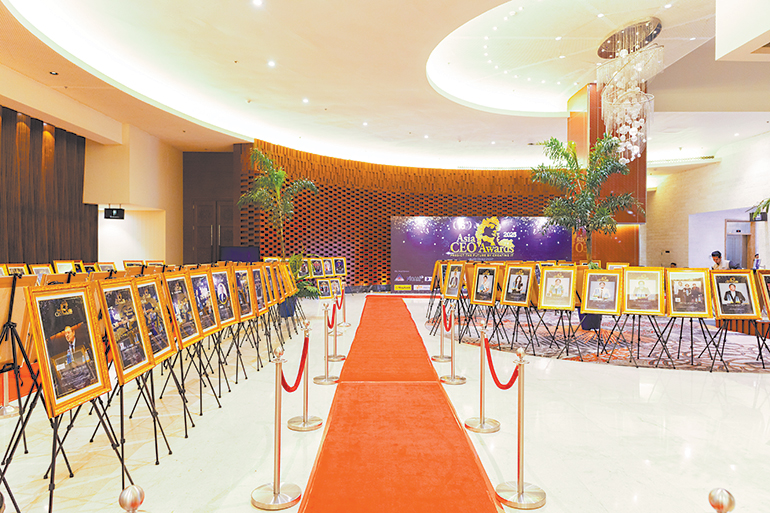 The CEO of the Year award went to Jean Henri Lhuillier, president and CEO of Cebuana Lhuillier, for his exemplary leadership in expanding financial inclusion and enhancing the Philippines’ standing in the global financial services sector.
The CEO of the Year award went to Jean Henri Lhuillier, president and CEO of Cebuana Lhuillier, for his exemplary leadership in expanding financial inclusion and enhancing the Philippines’ standing in the global financial services sector.
“Cebuana Lhuillier has long been more than just a pawnshop. We’ve evolved into a full-fledged microfinance center, and this recognition reflects the collective effort of our team in making financial tools accessible and meaningful for millions of Filipinos wherever they are in their financial journey,” Mr. Lhuillier said.
He attributed much of his success to his company’s continued empathy for the experiences of Filipinos, especially those struggling during times of hardship.
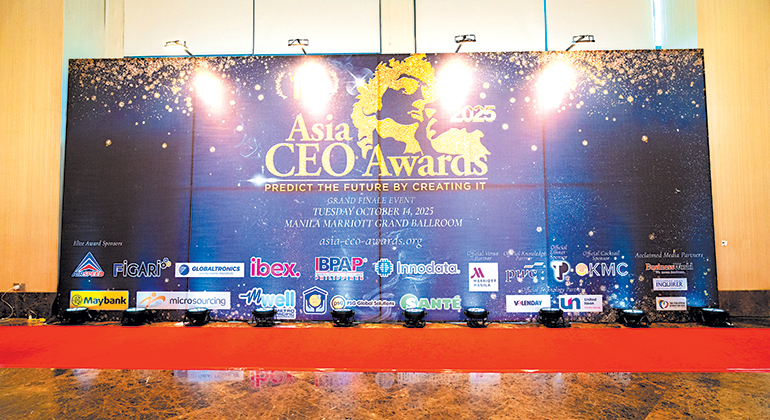 “The past few years have reminded us that real leadership means staying grounded in purpose, especially during times of uncertainty,” he said.
“The past few years have reminded us that real leadership means staying grounded in purpose, especially during times of uncertainty,” he said.
For instance, this year, Mr. Lhuillier strengthened Cebuana Lhuillier’s financial ecosystem to reach more Filipinos and drive inclusive growth. Through Cebuana Lhuillier Financial Corp. (CLFC), he expanded access to financing by enhancing programs such as the Advance Salary, Cycle Motorcycle, and OFW Loans — providing timely support to workers, entrepreneurs, and overseas Filipinos. He also scaled up MSME development through the Kanegosyo Center, which now equips over a million micro-entrepreneurs with funding, mentorship, and business tools. Under his leadership, Cebuana Lhuillier Services Corp. (CLSC) widened its global money transfer network to better connect Filipino families, while Cebuana Lhuillier Bank (CLB) advanced financial inclusion through broader access to savings, credit, and digital banking. Cebuana Lhuillier Insurance Brokers (CLIB) likewise expanded its protection offerings with HealthMax, a low-cost HMO; MindCare, for unlimited mental health consultations; and Takaful, a Shariah-compliant plan for Muslim clients. He also diversified the company’s portfolio through Cebuana Lhuillier’s jewelry and investment brands — Just Jewels, Gold Bar, and Re-Find — offering Filipinos more pathways to build and grow their wealth.

“Each decision was guided by one goal: to help more people remain financially resilient and move forward, even in disruptive times,” Mr. Lhuillier added.
Foodflow was recognized as the Globaltronics Most Innovative Company of the Year, honoring its cutting-edge solutions and management excellence that have achieved international recognition.
The Maybank Sustainability Company of the Year award was presented to Filinvest REIT Corp., acknowledging its initiatives in sustainable real estate development and its efforts to integrate environmental responsibility and corporate governance into business growth.
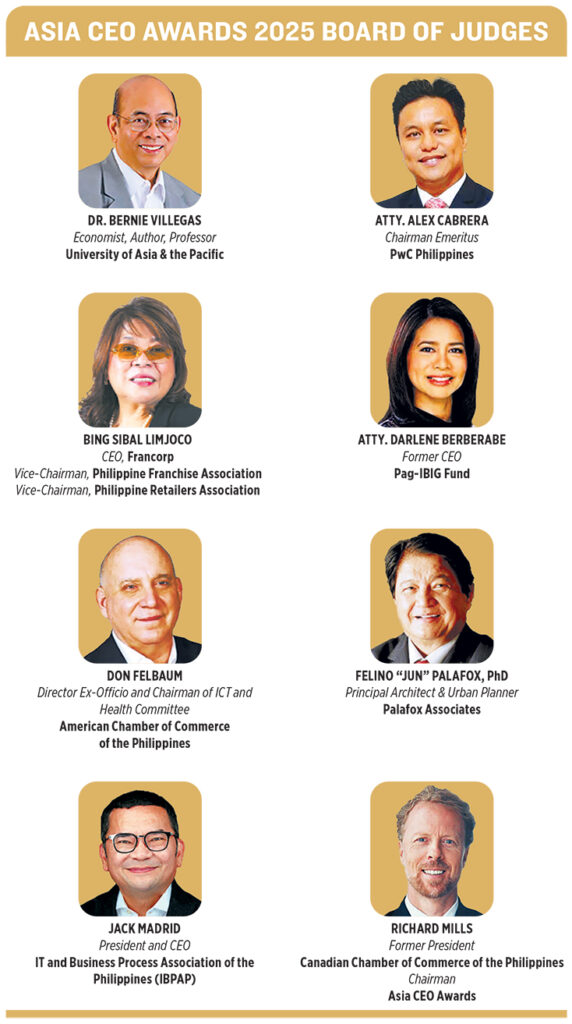 GCash received the Sante Wellness Company of the Year award for its programs promoting employee well-being and workplace health as part of its broader organizational culture.
GCash received the Sante Wellness Company of the Year award for its programs promoting employee well-being and workplace health as part of its broader organizational culture.
Roselle Marisol Belleza Andaya, CEO of MR.DIY, was named ibex Woman Leader of the Year for her outstanding leadership in the retail sector and for advancing opportunities for Filipino women in business.
“It’s truly an honor. This recognition is deeply personal, but it’s also a powerful reflection of the incredible team behind MR.DIY Philippines,” she said.
“Every store we open, every community we serve, and every initiative we launch is powered by people who believe in purpose-driven retail. So, while my name may be on the award, it represents the collective spirit of our organization — one that values integrity, inclusivity, and innovation.”
 Ms. Andaya noted that as retail transforms further to become “more immersive, more responsive, and more human,” MR.DIY will continue to invest in local talent, expanding access to affordable essentials, and using technology to enhance, not replace, the human touch.
Ms. Andaya noted that as retail transforms further to become “more immersive, more responsive, and more human,” MR.DIY will continue to invest in local talent, expanding access to affordable essentials, and using technology to enhance, not replace, the human touch.
“Retail is no longer just transactional — it’s transformational. And we’re proud to help lead that shift, one store, one community, and one empowered team at a time,” she said.
More Electric and Power Corp. won the Innodata CSR Company of the Year award for its community-centered initiatives promoting environmental protection, livelihood programs, and youth development.
 Finally, VXI Global Holdings B.V. Philippines was recognized as the Pag-IBIG Top Employer of the Year, highlighting its excellence in workforce management and commitment to nurturing Filipino talent on the international stage.
Finally, VXI Global Holdings B.V. Philippines was recognized as the Pag-IBIG Top Employer of the Year, highlighting its excellence in workforce management and commitment to nurturing Filipino talent on the international stage.
Metro Pacific Investments Corp. (MPIC) chairman, president and CEO Manuel V. Pangilinan also received the Lifetime Contributor Award from the Board of Judges, as his contributions have impacted the lives of all Filipinos. His MPIC has transformed the nation’s infrastructure through PLDT/Smart (telecommunications), Meralco (power), Maynilad (water), tollways, and many others.
 Through these awards, the Asia CEO Awards 2025 continues to celebrate organizations and leaders who are shaping the country’s economic and social future, underscoring the Philippines’ growing role as a hub for innovation, inclusivity, and world-class enterprise.
Through these awards, the Asia CEO Awards 2025 continues to celebrate organizations and leaders who are shaping the country’s economic and social future, underscoring the Philippines’ growing role as a hub for innovation, inclusivity, and world-class enterprise.


